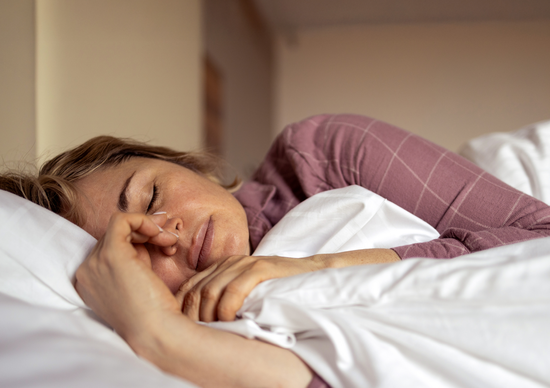Menopause is a natural biological phase that every woman will experience eventually. This life stage not only brings physical changes but also presents an opportunity for self-reflection and actively embracing a new chapter. Here, you will find everything you need to know about the causes, symptoms, and phases of menopause to gain a deeper understanding of this transition.

The menopause
Understanding the menopause: Causes, symptoms, and stages of hormonal changes
What is the menopause?
Menopause is often used to describe the entire transition period leading up to the final menstrual cycle. Medically, however, menopause refers specifically to the point in time: when a woman experiences her last period, marking the permanent end of menstruation. This date symbolises the end of fertility. Doctors define menopause as occurring after 12 consecutive months without a period. The average age for menopause worldwide is between 45 and 55, though individual experiences can vary. Menopause is caused by a natural decrease in the production of the hormones oestrogen and progesterone in the ovaries. These hormonal changes affect many bodily functions and can lead to a range of various symptoms.
Causes of the menopause
Menopause is a natural process that is usually triggered by age-related changes in the ovaries. In some cases, however, other factors can bring on the menopause:
- Surgical procedures: Removal of the ovaries (ovariectomy) or uterus (hysterectomy) can lead to premature menopause.
- Cancer treatments: Chemotherapy and radiotherapy can affect ovarian function.
- Genetic predisposition: Some women experience an early menopause due to genetic factors.
- Autoimmune diseases: Some diseases can disrupt the production of hormones in the ovaries.
Menopausal symptoms
The symptoms of the menopause vary greatly from person to person. Here are some of the most common symptoms:
- Hot flushes: Sudden feelings of warmth, often accompanied by sweating.
- Sleep disorders: Problems falling and staying asleep, often caused by hot flushes or night sweats.
- Mood swings: Irritability, anxiety or depressive moods.
- Dry skin and mucous membranes: Often in sensitive areas such as the vaginal mucosa.
- Weight gain: Often caused by a slowing of the metabolism.
- Decreased libido: Some women report a decrease in sexual desire.
- Cognitive changes: Concentration and memory difficulties may occur.
If these symptoms are severely affecting you, consult a specialist to find solutions to suit you.
The phases of the menopause
A woman's hormonal balance starts to shift gradually in her late thirties, which can have a noticeable impact on her overall well-being. This usually insidious process is called premenopause.
In the premenopausal stage, it can be beneficial to have your hormones tested while you are feeling well. This gives you "target values" that can be used for comparison later on.
This involves measuring estradiol, progesterone and testosterone.
The premenopause often transitions seamlessly into the perimenopause. This long transition phase includes the years before and after the last period. The menopause itself is only a brief moment: The time of the very last period.
The menopause can be broken down into three main phases, each with its own distinct characteristics and effects: Perimenopause, menopause and postmenopause
1. Perimenopause
Perimenopause begins several years before the menopause proper. During this period hormone levels fluctuate, which can trigger the first symptoms such as irregular menstrual cycles and hot flushes. This phase can last from 4 to 10 years.
2. Menopause
This term refers to the point in time when there has been no menstruation for at least a year. The symptoms are often particularly pronounced during this phase.
3. Postmenopause
Postmenopause begins after the menopause and lasts for the rest of your life. While many symptoms gradually subside, the risk of certain conditions such as osteoporosis and cardiovascular problems increases.
How can you support your body during this time?
You can often positively impact the symptoms of the menopause and improve your quality of life by consciously adopting a healthy lifestyle:
Diet: Make sure you have a balanced diet rich in calcium, vitamin D and antioxidants to strengthen your bones and bolster your immune system.
- Exercise: Regular exercise boosts your metabolism, is good for your heart and helps you to stay mentally balanced.
- Stress management: Techniques such as yoga, meditation or breathing exercises can help you to better manage fluctuating emotions.
Personalised therapies: Hormone replacement therapy (HRT) may be considered in consultation with specialists. Alongside HRT, the use of nutritional supplements containing ingredients such as soy isoflavones is also recommended.
The menopause is a natural phase in life that brings challenges, but opportunities too. With the right knowledge and mindful choices, you can actively influence this period. If your symptoms are affecting your quality of life, it is essential that you seek medical advice.
3-phase tablet for support during the menopause
Discover ricare® Menopause Support – the innovative 3-phase tablet that supports you during the menopause with a targeted supply of nutrients and promotes your overall well-being.
Things to know about ricare®
The key essentials on the health topics covered by ricare®: Menopause, periods, sleep and headaches



